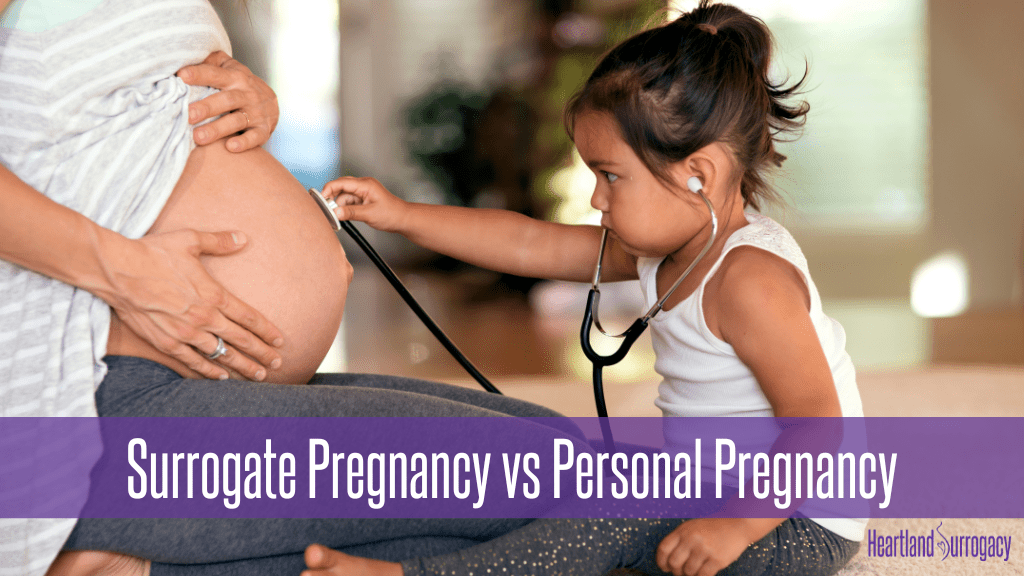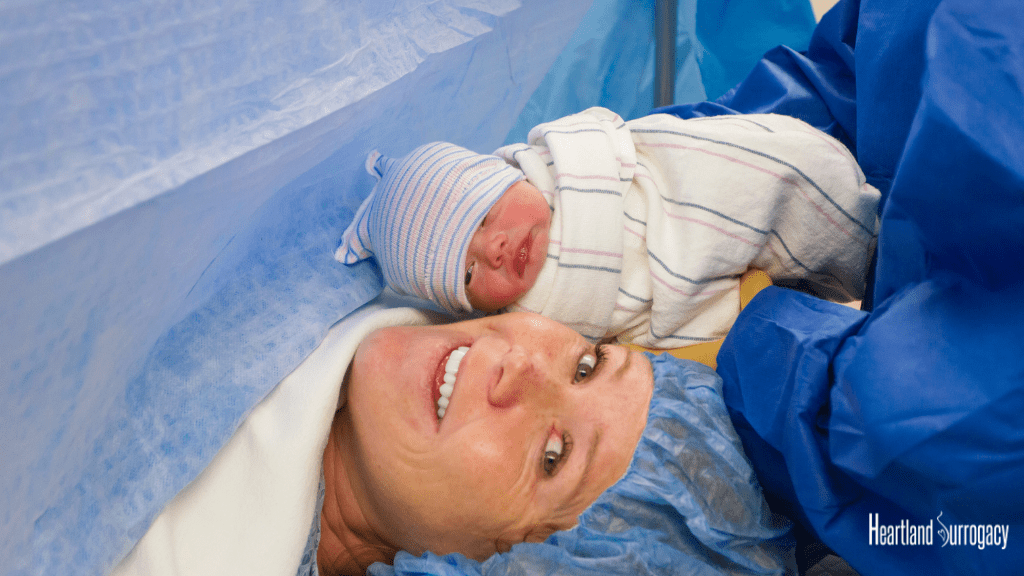My Surrogacy Pregnancies vs. My Own Pregnancies
No two pregnancies are the same. Even for those who have been pregnant more than one time, their birth stories can differ. The same can be said when to carrying your own child and carrying a child as a gestational carrier. They’re not always the same experience.

Are Surrogate Pregnancies Harder?
The reasons why these pregnancies are dissimilar are often misunderstood by others. There are a number of problematic misconceptions of what a surrogacy pregnancy actually feels like to the carrier.
One of those misconceptions is that surrogate pregnancies are physically harder and more demanding on the surrogate’s body.
I don’t think there is anything about carrying a baby for someone else that automatically makes the pregnancy more difficult. One pregnancy can be harder than another, but that can happen to a woman carrying her own child or a surrogacy baby. There was nothing in my surrogacy pregnancy that challenged me more than when I was an expectant mother. Complications can arise regardless of the woman’s relationship to the baby.
Ways in Which My Surrogacy Pregnancy Was Easier
But surrogacy pregnancies are not always the same experience as with personal pregnancies. And in some ways, carrying someone else’s baby was easier for me. Recovery, for instance, looked very different for me as a surrogate compared to having my own children.
I think this is decidedly true for surrogates who undergo cesareans. Maternity leave offers surrogates recovering from surgery in a different way than it had when they brought baby home.

Recovery from my surrogate pregnancy looked and felt much different than it did when I brought my own babies home. Having had two previous C-sections, I was able to give my body more of what it needed after my surrogacy delivery, which was also a C-section. I felt back to my normal self faster than I had after my other two cesareans because I was able to have more rest and recuperation.
Surrogates actually get the better end of the deal when it comes to the preparation portion of being an expectant parent. While I was in the midst of my surrogacy pregnancy, there were no long-term budgets needing to be evaluated and no interviewing prospective daycares. I didn’t have to prep a nursery or make countless purchases of diapers, wipes, bottles, and other necessary essential newborn supplies.
Even though it can be incredibly fun picking out new things for baby, I personally appreciated not having to do all of that for a third time.
Other Differences in My Surrogacy Pregnancy
The biggest physical difference between my surrogate pregnancy and carrying my own children was the fact that I was monitored so closely before and during. I had to complete a med cycle and go through more tests, such as bloodwork and pre-transfer ultrasounds. I attended more prenatal ultrasounds leading up to delivery. None of this, however, was overly difficult or added unusual stressors to the pregnancy.
And even though a surrogate is being compensated by the intended parents, that doesn’t mean they’re at the whim of the parents. I still very much had a voice in how my journey went. The difference was that I was collaborating with the intended parents on it. My comfort was major point of discussion with the intended fathers from the get-go.
How does the surrogate envision delivery? Who will be in attendance of the birth? Will the parents be allowed in the room at prenatal appointments? These types of questions are asked at different stages in the journey, probably on more than one occasion. Conversations are had and plans are made to ensure all parties are comfortable, including the surrogate.
The Reality of Surrogate Pregnancies
The emotions between the two types of pregnancies can also be different for surrogates. Sometimes surrogates are perceived as emotionless, which is what makes it so effortless for them to give up a baby they just carried and delivered. That couldn’t be further from the truth.
On the whole, I believe surrogates are inherently emotional people. We are so overflowing with emotions that we’re able to set aside our own feelings in order to help others.
That’s right, I said, “set aside our feelings.” Because even though the baby isn’t ours, we still bond with the baby. A surrogate still connects and loves the sweet little life growing within, all while knowing full well that child belongs to another.
I went through my surrogate pregnancies in a particular headspace. I knew from the very beginning that the baby was not mine and I would be leaving the hospital without a child. It’s the name of the game. That being said, a stream of connective feelings cemented my place in the life of the baby and the baby to mine.
Women who give their bodies for the sake of another family are incredibly resilient, both physically and emotionally. While it might seem callous or heartless to give up something so precious, it’s not seen or felt that way by a gestational carrier. That precious thing is the ultimate gift and bestowing that gift to someone else is a gift in itself. There is nothing callous in that.
And let’s not forget about the dreaded postpartum monster. Yes, surrogates can experience postpartum depression or anxiety. Postpartum depression and anxiety do not discriminate. It doesn’t know the difference between a new mother and a gestational carrier. It can strike regardless.
Completing the Surrogacy Journey
I personally went through a strange sort of transition. For a little more than a year, the surrogacy was a driving force for me, something that I was so proud to be a part of. And all of a sudden it was over. I didn’t quite know what to do with myself for a few weeks after delivery. Luckily, I healed, got back to myself, and life took over. I was pulled back into the normal flow of things and I was able to shake it.
There is a bright side to this somewhat sobering reality, though. Surrogates going through something as mentally and emotionally strenuous as postpartum recover do have resources to take advantage of. Mental health services are commonly available for surrogates before, during, and after baby comes into the world.
If you think about it, being a surrogate is kind of like being a cool aunt. You get to hang out with the baby for a bit, then give the baby back to their rightful parents. There’s a sense of responsibility to care for and protect the baby. It’s only temporary. And the long-term responsibility remains with the parents. Often referred to as extreme babysitting, a surrogate really does just go about their lives while a baby grows, usually with minimal interruption.
When it’s all said and done, no matter how difficult or easy breezy it was, the surrogate has one more birth story to tell. The good and the bad and the breathtakingly beautiful.
What will your experience be like as a surrogate?
